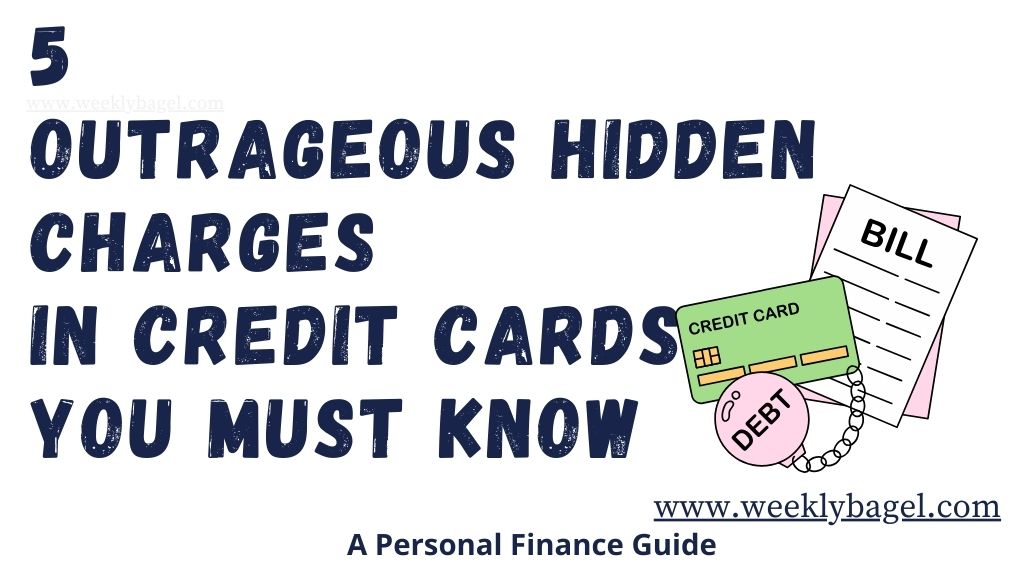
One of the woes of having a credit card is the cost of having a credit card. It is true a credit card may cost absolutely nothing to get; however, it is a liability which could get you into serious debts. This is because of hidden charges in credit cards.
What are hidden charges in a credit card?
Hidden credit card fees are charges which you are not made aware of, when you sign up for a credit card. Do not be surprised. Credit card companies have a habit of not fully discussing their terms and conditions with customers during credit card application. I wrote about this on How Credit Card Companies Target College Students As Money Cows.
Are hidden credit card fees illegal?
No, they are not because you agree to them when you sign a card issuer’s terms and conditions. As I have always stressed on my articles: CREDIT CARD INSTITUTIONS ARE NOT YOUR FRIENDS. They are there to make money off you. As a result, they attached hidden features within their terms and conditions which could maximize their profits per your expenditure.
Overall, these hidden fees increase the cost of using credit cards which translates as debt for you and profit to them. Here is what else to know.
Hidden Charges In A Credit Card
These are the hidden fees in a credit card, which could increase the cost of using credit cards for you. Be sure to look for them before you sign up for a credit card, because knowing about them will save you a lot of headaches.
1. Late Payment Fees
There is a penalty for paying your credit card late. During a credit card application, most issuers make it a habit not to inform you about it. It is one of those things they will not talk about it, if you do not ask them.
Save yourself from future financial stress by asking about it. This is because the average late fee a credit card will charge you could be up to $32. As of March 2024, The Consumer Financial Protection Bureau (CFPB) is trying to ban excessive late fees. It is passing a rule which will require credit card companies to charge $8 from the average $32 they are used to.
Personally, I would recommend you always ask about a card issuer late payment fee prior to sign up. This is because it adds to your total credit card debt. A reasonable late payment fee on a credit card should be within the new CFPB rule of $8 per incident. Be sure to ask before you sign up to make sure it is not more than that.
2. Returned Payment Fee
What is a return fee on a credit card payment?
A return fee on a credit card payment occurs when you do not have sufficient balance on your credit card. This is due to you maxing out your credit card. As a result, your issuer will charge you for trying to purchase with a maxed out credit card.
A returned payment fee is one of the hidden charges in a credit card, which most issuers will not discuss with you unless asked. Somewhere amongst the written terms and conditions, it is there. You have to look for it to know what it is before you apply for a card.
The return fee is up to $35. It depends on the card issuer, because different card issuer charges different fees. But, they are all have one thing in common; most credit card issuer will not talk about this outrageous fees with you, unless you ask them about it.
3. Over-Limit Fee
An Over-Limit fee is a charge on credit card, because you exceed your credit limit. It is a catalyst for a lot of debt issues, when you are a working class adult. This is because it is the same as a fee charged for a credit card maxed-out. I discuss the impact on your overall financial health on what happens when you maxed out a credit card.
Anyways, a credit card hidden fee like this one could ruin your credit score. This is because you are reported to a credit bureau whenever you max out your credit score. So, you are not only stuck with a fee in addition to your debt, but also a ruined credit score and history.
Over-limit fee is one of the terms and conditions you agree during your credit card application. Therefore, a credit card issuer reserves the right to charge it. This is because you signed the terms and conditions. It is another reason why I highly recommend you ask about this outrageous fee before you sign up for a credit card.
4. Maintenance Fee
Some credit card issuers have annual fee, which is charged to you to continue using their cards. This is also called a maintenance fee. You have to ask about it, because not all credit issuers charge this kind of fee.
What is the average annual credit card fee, dear reader?
The Consumer Financial Protection Bureau report on Feb 16th 2024, found large banks charge up to $157 for annual fees. This is as opposed to small issuers’ $94 annual maintenance fee on credit card. This is a lot when you think about it. Not every working class adult can afford to pay this much, just to use a credit card they will be paying on.
I cannot stress how important it is to ask a credit card issuer about any membership fee. This is because some of the high-end credit card issuers can charge an outrageous price to maintain a credit line with them. As a working class adult, I will not recommend paying money to have a credit card.
Personally, I see having a credit card as doing a bank a favor and not the other way around. This is because you pay back every expenditure with interest. It is not free money, hence why you need to be aware of hidden fee meant to exploit you.
5. Convienence Fees
A business will charge you a convenience fee, when it does not accept a credit card which you make a payment with. This is also called card processing fee. Usually, some card issuers will take care of the convenience fee for you. Others let the charge be deducted from your credit balance.
Is it illegal to charge a convenience fee for credit cards?
No, it is not illegal for a business to charge a convenience fee for credit cards. This is as long as it is communicated to you at the point of sale. What you must know before applying for a credit card, is whether the card issuer takes care of this hidden fee so you do not have to. This is important, since this fee can add to your total credit card debt.
I recommend reading the terms and conditions thoroughly. The amount ranges from 1.5% to 3.5%. If you cannot find anywhere it mentions about this hidden fee, call the card issuer and ask about it.
How To Avoid Extra Charges On Credit Cards
The best way to avoid hidden fees on credit card, is to read your terms and conditions carefully before signing them. This is because you are giving the issuer rights to charge you certain hidden fees, which may not have been explained to you. It is completely legal.
In addition, you have to stay within the terms and conditions you have agreed on. For example, you must make your payments on time to avoid late fees and a hike on interest rates. All which contribute to mounting credit card debt.
Finally, be sure not to max out your credit card. A max out credit card comes with a barrage of fees, when you cannot keep up with your monthly payment. This is besides being a blemish on your credit history and a ruin to your credit score.
I believe you can avoid hidden charges in a credit card, when you pay attention to these things. This is especially, when you are a young working class adult starting out. Otherwise, you will be boggled with debt before you have a chance at setting yourself up for success in life




 How To Get A New Chime Card Without Stress
How To Get A New Chime Card Without Stress